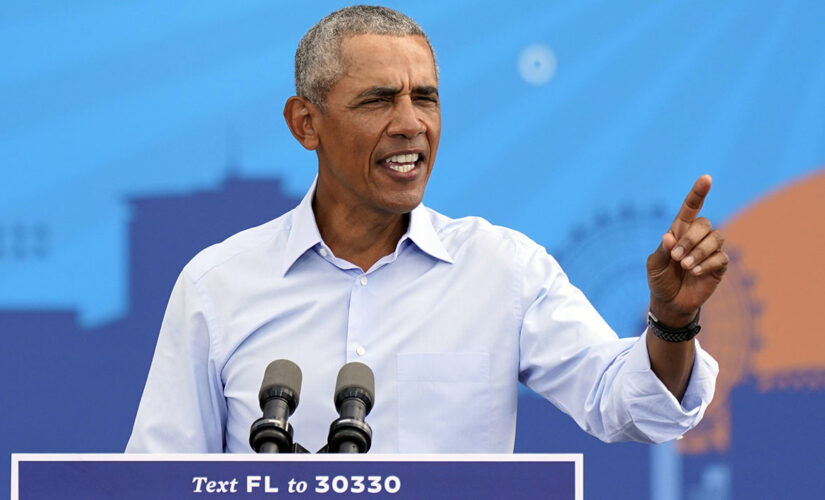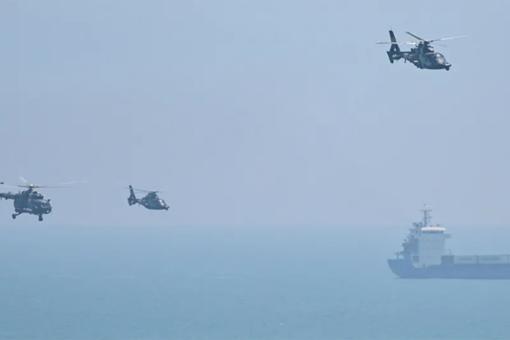NEWYou can now listen to Fox News articles!
After the Obama administration ended the Pentagon’s “two-war” doctrine in 2012, the United States shifted to only likely being capable of battling one major regional conflict, not two simultaneously. A decade later, the U.S. could face the issue of having to choose whether to get involved with a potential war in Ukraine or Taiwan.
“It means we can’t do both,” senior research fellow for Defense Programs at the Heritage Foundation told Fox News Digital in a phone interview when asked if the U.S. would hypothetically be able to fight in both Ukraine and Taiwan.
Former President Barack Obama and then-Defense Secretary Leon Panetta announced a new strategy in January 2012 that ended the Cold War-era “two-war” planning construct.
Former President Barack Obama speaks at a rally for Democratic presidential candidate former Vice President Joe Biden, at Northwestern High School in Flint, Mich., Saturday, Oct. 31, 2020. (AP Photo/Andrew Harnik)
(AP )
The two-war doctrine established that the U.S. should be capable of fighting two major regional conflicts simultaneously, and guided military planners through the Korean and Vietnam wars, as well as the wars in Iraq and Afghanistan after 9/11.
“When the Obama team came in, they had a very specific … agenda. It was very domestically focused, and their worldview was such that nearly all problems can be resolved diplomatically via trade,” Wood said. “The perception was you just didn’t need a big U.S. military.”
RUSSIA’S INVASION OF UKRAINE PUTS TAIWAN ON HIGH ALERT MAINLAND CHINA THREAT
Wood explained that the Obama administration wanted to establish that it’s “not really a two-war world” anymore, and to instead have a military that could handle one major crisis while balancing smaller “pop-up sort of crises or to maintain a presence.”
Obama said at the time that the U.S. military would become “leaner” but would maintain its “military superiority with armed forces that are agile, flexible and ready for the full range of contingencies and threats.”
The military has in fact become leaner, with the number of Naval ships shrinking from about 570 in the late 1980s to 296 ships today, according to Wood.
U.S. lawmakers have warned this month that “World War III” could be sparked in Europe if the U.S. gets directly involved with Russian forces invading Ukraine. While in Asia, the threat of China invading Taiwan looms large.
MOSCOW, RUSSIA – JUNE,5 (RUSSIA OUT) Chinese President Xi Jinping attends the extended meeting at the Grand Kremlin Palace in Moscow, Russia,, June,5, 2019. Chinese leader Xi Jinping is having a three-days state visit to Russia. Photo by Mikhail Svetlov/Getty Images ___ MOSCOW, RUSSIA – JUNE,5 (RUSSIA OUT) Russian President Vladimir Putin speeches during Russian-Chinese meeting at the Grand Kremlin Palace in Moscow, Russia,, June,5, 2019. Chinese leader Xi Jinping is having a three-days state visit to Russia.
(Photos by Mikhail Svetlov/Getty Images)
WHAT WOULD HAPPEN IF THE US IMPOSED A NO-FLY ZONE IN UKRAINE?
Ukrainian President Volodomyr Zelenskyy has called on U.S. and foreign leaders repeatedly to impose a no-fly zone over the country. His appeals, however, have so far been rejected by the U.S.
The U.S. adheres to a policy reaching back to the Cold War of not having direct, kinetic engagement with Russia. A no-fly zone would risk a direct military conflict with the country, and has the potential of escalating to a third world war, pitting nuclear power countries such as the U.S., France and the U.K. against fellow nuclear power Russia.
Russia’s invasion of Ukraine meanwhile has Taiwan on high alert that China could invade. China views Taiwan, which sits off the coast of mainland China, as a breakaway province that will one day be a part of the country. Taiwan operates as an independent country.
CHINA’S SUPPORT OF RUSSIA’S UKRAINE INVASION HAS A BREAKING POINT: EXPERT
Thousands of U.S. soldiers are reportedly headed toward Australia as tensions with China grow. Roughly a thousand Marines have already landed in the Northern Territory city of Darwin, which sits just south from a handful of Asian countries, the Daily Mail reported.
Wood said that if the U.S. were to hypothetically get involved with the two potential wars, “national leadership would have to decide which theater is more important.”
Hong Kong students and Taiwanese supporters hold slogans during a march in Taipei, Taiwan, Sunday, Sept. 29, 2019. Sunday’s demonstration was part of global “anti-totalitarianism” rallies planned in over 60 cities worldwide, including in Australia and Taiwan, to denounce “Chinese tyranny.” (AP Photo/Chiang Ying-ying)
(AP Photo/Chiang Ying-ying)
“In a Taiwan scenario, we have no treaty obligation to come to Taiwan’s rescue. There was the Taiwan Relations Act that was intentionally written rather ambiguous, that the U.S. supports diplomatic solutions to resolve the condition that exists between the People’s Republic of China and the Republic of China,” Wood said.
“If we got involved in Ukraine, it’s basically all-in. We have a much more robust, in some ways, relationship economically, culturally, historically with Europe than we do with Taiwan,” he said.
Former President Donald Trump, who increased the military spending budget and created the first new military branch in 72 years, did not revive the two-war doctrine.
Wood said that the two-war doctrine is likely not prevalently being discussed due to it being financially cumbersome, but also because of its emotional implications.
CLICK HERE TO GET THE FOX NEWS APP
“It says that you are thinking that there might actually be wars out there in the world, and so we have to beef up, we have to militarize. Nobody likes to really say that.”




